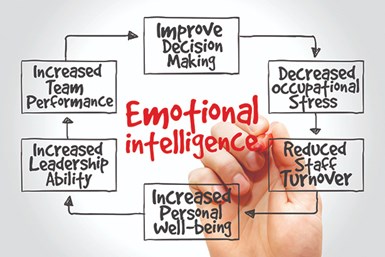How Emotional Intelligence Helps Sustain a Workforce — Part 1
The lack of available skilled workers is an ongoing issue. It’s easier to keep a good employee than to find one. A leader can leverage Emotional Intelligence skills to keep the workers they have.
#pmpa #workforcedevelopment

Workforce Development. Many shops are feeling the lack of skilled workers in our industry, which means that workforce development is high on their priority list. Developing young people to become a skilled workforce for hire is what comes to mind when the words workforce development are mentioned. But what about the skilled performers you already have? It is well known that it is easier and cheaper to keep the customer you have than to find a new one. The same principle applies to your employees.
Performers Leave Bosses, Not Jobs
Have you ever left a job you liked — or even loved — because of a bad boss? Think about what made them a bad boss. Did they yell, berate or devalue your skills? Or maybe they didn’t acknowledge your skills at all? Or maybe they were unapproachable, didn’t trust you or didn’t listen. O.C. Tanner Institute and HealthStream did a study on 100,000 Americans and Canadians who voluntarily left their job and 79% of them stated that their key reason for leaving was that they were not valued.
Featured Content
The EI Advantage
So what can you offer as a leader to give yourself an advantage and keep your performers who like their job? Emotional Intelligence (EI) is one advantage that does not cost a dime, but can make a large impact on your performers.
What is EI? EI is an ability for someone to understand and manage their emotions, as well as to understand the emotions of others. Why is this important? Because your performers are humans with human emotions that can’t always be left at the door. They carry those emotions with them into work, whether it is a fear, worry or mental fatigue. They also bring in joy and excitement! But if this pandemic has taught us anything, it is that fear of getting sick or a loved one sick is palpable. Additionally, people deal with financial issues, family issues and health issues, all of which can weigh on a person.
As a leader, you can be aware of the emotions of others. You don’t have to know exactly what is going on — there are HR considerations — but knowing that your performers are dealing with something may help you understand why they are working, reacting or not reacting as expected. Showing you are concerned about them or a simple acknowledgement that they are doing a good job is often enough.
Recognizing Good Work
It’s amazing what an “Atta boy/girl” can accomplish. Here’s the secret — sincerity. You have to mean it. Otherwise it’s patronizing and the purpose is defeated. It can be a public acknowledgement such as an employee spotlight or it can be private in a one-on-one setting. It can even be as you are walking by and you recognize a job well done.
You hired your performers for a reason. And if you can’t find something good that a performer is doing, then you may want to evaluate why you still employ them. Once you have started looking for the good work, you may be surprised at how much you find.
How Emotional Intelligence Helps Sustain Your Workforce — Part 2 (May 2021) discusses the five elements needed to learn EI.
About the Author
Carli Kistler-Miller
Carli Kistler-Miller, MBA, has over 20 years of experience with communications, event/meeting planning, marketing, writing and operations. Email cmiller@pmpa.org at PMPA.
RELATED CONTENT
-
Ventilator Crisis — Clippard Delivers for Ford
Clippard Instrument Laboratory Inc. in Cincinnati, Ohio, harnessed their talent, experience, capabilities and PMPA network to deliver 50,000 sets of ventilator parts to Ford Motor Company.
-
Rapid Methods for Determining the Weight of a Steel Bar (Imperial Units)
Counting bars in a bundle and multiplying by weight per bar allows a quick “reality check” on whether or not the tag weight is correct, or how much weight is left in the rack.
-
Recovery, Recrystallization and Grain Growth — Three Phases of Annealing
Below are some of the terms and effects applicable to annealing steel.






